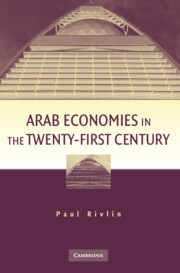3 - The Constraints of History
Published online by Cambridge University Press: 05 June 2012
Summary
Differences and Commonalities
The eight economies examined in this book are very different. Saudi Arabia and Iraq are rich in oil and gas, but have very different levels of income largely because of the devastating effect of wars on the latter. Tunisia has led the Arab world in terms of industrialization and has the highest per capita income of the non-oil states. Jordan has among the best educational and other human development indices. It has also moved a long way toward a liberalized economy and has, in recent years, dramatically increased its industrial exports. Egypt is the largest country demographically but despite reforms, it remains very poor. Morocco stabilized its economy before Egypt and is further ahead in terms of demographic transition but has high illiteracy rates and poverty levels. The Palestinian economy has much human capital but, even within the limits of autonomy, developed a destructively corrupt regime. Its economy has been badly affected by years of conflict and the legacy of occupation. Syria's economy is frozen in the past: economic reforms have been limited and security considerations remain dominant. The decline in its oil revenues is a major threat to economic stability because the non-oil sector has been so badly neglected.
Despite these and other differences, there are a number of factors that these and other Arab economies have in common. The first is that they are all, with the possible exception of the Palestinians, experiencing demographic transition.
- Type
- Chapter
- Information
- Arab Economies in the Twenty-First Century , pp. 36 - 60Publisher: Cambridge University PressPrint publication year: 2009



